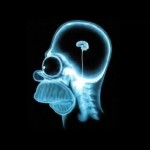The Internet will fry your brain. Sure.
 The Boston Globe has a good article/ book review on the latest quasi-luddite attack on the Internet (an attack in the name of brain science no less, and with cool brain scans). The book in question: “The Shallows: What the Internet Is Doing to Our Brains.”
The Boston Globe has a good article/ book review on the latest quasi-luddite attack on the Internet (an attack in the name of brain science no less, and with cool brain scans). The book in question: “The Shallows: What the Internet Is Doing to Our Brains.”
The Internet ate my brain (Boston Globe)
— Nicholas Carr says that our online lifestyle threatens to make us dumber. But resistance may not be futile
The reporter, Wes Anderson, adds the proper perspective, in my view, by ending the article with:
“Books and the Internet, literary culture and digital culture have coexisted for many years. It may be that an engaged intellectual life will now require a sort of hybrid existence — and a hybrid mind that can adapt and survive by the choices one makes. It may require a new kind of self-discipline, a willed and practiced ability to focus, in a purposeful and almost meditative sense — to step away from the network and seek stillness, immersion.”
“Now, you can call this hybrid mind shallow. I call it all my only hope.”
Wes: you’re quite right. Not only that, but the Internet-enabled “weaponry to resist”, what we prefer to call a toolkit to monitor and enhance cognition/ brain fitness in ways we couldn’t do before, is growing by the day. We’ll just need to learn to use it properly ‑and the Internet as a whole, to be sure‑, to enhance our lives. My bet is: we will.
Nicholas Carr does a great job highlighting the implications of lifelong neuroplasticity ‑everything we do/think/feel has a physical and functional impact on our brains, for better or for worse‑, but misidentifies our brains most likely enemy (watching TV? chronic stress?), and fails to consider that we tend to learn how to ride bikes by riding bikes.



Yes, I was blogging about this today — with almost the same headline: http://tinyurl.com/2fwz5za
I am more skeptical about the human race than you. When you say “we,” in regard to those who will “enhance” life with the Internet, I imagine you are speaking of the minority who are able to remain mindful of their own information consumption and maintain a healthy information diet.
There is an endless amount of information on physical health, yet two-thirds of Americans are overweight or obese.
I imagine at least that same portion of society will have unhealthy information diets and not “enhance” their lives with information.
“… in an information-rich world, the wealth of information means a dearth of something else: a scarcity of whatever it is that information consumes. What information consumes is rather obvious: it consumes the attention of its recipients. Hence a wealth of information creates a poverty of attention and a need to allocate that attention efficiently among the overabundance of information sources that might consume it.” Herbert Simon (1916 — 2001)
Ted — good post, I agree. I also saw yesterday the excellent book review by Jonah Lehrer in the NYT.
Kent — thank you for reflection. I share your skepticism that not everyone will benefit equally, but, indeed, I seem more optimistic about the human species. It is not only a few but the many whose life expectancy has increased by over 30 years in just a century. If I had been born centuries ago, I´d most likely be dead now.
Yes, the modern world presents us with an overflow of information, which can be overwhelming — it is precisely for that reason that we need to innovate on how to enhance attention, information processing power and other mental capacities so that we, not the Internet, is the master (a possibility that Herbert Simon, at least in that quote, didn´t consider).
The irony is that it is published on the net :)
Well, I find myself in this post. I guess human is not what was before, and surely we changes with time and technology process have the biggest influence to it.